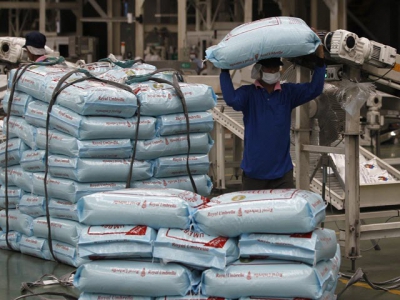Indian, Thai rice markets quiet; Bangladesh clamps down on hoarders

A worker carries a sack of rice at Nakhonluang factory in Ayutthaya province, north of Bangkok July 3, 2013. Photo: Reuters
Top Asian rice exporters India and Thailand saw muted activity this week, while a government clampdown on hoarding pushed down local prices of the staple in Bangladesh.
Thailand’s benchmark five percent broken rice prices were unchanged from last week at US$390–$402 per metric ton, free on board Bangkok.
“Right now the stronger baht is the main factor influencing prices, but that hasn’t helped us sell rice,” a Bangkok-based trader said.
While demand has hardly changed, supply is expected to jump next month, traders said.
The baht has gained nearly 3.4 percent versus the dollar so far this year.
“The Philippines remain the market that Thai exporters look to, but so far things have been quiet,” another trader in Bangkok said.
Thai exports are expected to fall 14 percent this year as a stronger currency makes shipments more expensive for overseas buyers, the country’s rice exporters association said.
Thai growers have also faced increased competition from India, the world’s biggest rice exporter, and Vietnam, the third biggest, Chookiat Ophaswongse, the association’s honorary president, told a news conference.
Prices for India’s benchmark five percent broken parboiled variety were also unchanged, at $381-$386 per metric ton, due to sluggish demand.
Export prices in India had shot up after the central state of Chhattisgarh, a leading rice producer, raised minimum paddy buying prices.
“African buyers are just making inquiries, but trade is not happening,” said an exporter based at Kakinada in Andhra Pradesh.
In neighbouring Bangladesh, domestic prices of the staple have started to drop slightly this week after the government vowed to take punitive measures against hoarders.
“Action will be taken against the traders who had stockpiled to create an artificial crisis in the market,” said a commerce ministry official, adding a recent spike in rates was unwarranted given healthy reserves and good crop.
Higher domestic prices for the staple had prompted speculation among traders that the government would cut the import duty, which the government has ruled out.
In Vietnam, rates for the benchmark five percent broken rice rose to $350 a metric ton from $340 last week, but business was quiet, traders said.
“There will be virtually no shipments from Vietnam over the next week due to the Lunar New Year holiday,” a trader based in Ho Chi Minh City said.
Government data released on Tuesday showed Vietnam’s rice exports in January likely fell 18.5 percent from a year earlier.
Có thể bạn quan tâm
 Viet Nam loses out on global market without rice brand
Viet Nam loses out on global market without rice brand Trung An Hi-tech Farming JSC in the Cửu Long (Mekong) Delta has been exporting rice under foreign brand names for many years though it is itself one of the big
 Rice export growth may slow as demand drops from big customers
Rice export growth may slow as demand drops from big customers Vietnam had a prosperous rice export year in 2018, but has been warned of a tough year in 2019.
 Asia Coffee Vietnam shipments seen halted on holiday; Indonesia trade quiet
Asia Coffee Vietnam shipments seen halted on holiday; Indonesia trade quiet Coffee shipments from Vietnam are expected to fall sharply next week on the Lunar New Year holiday.